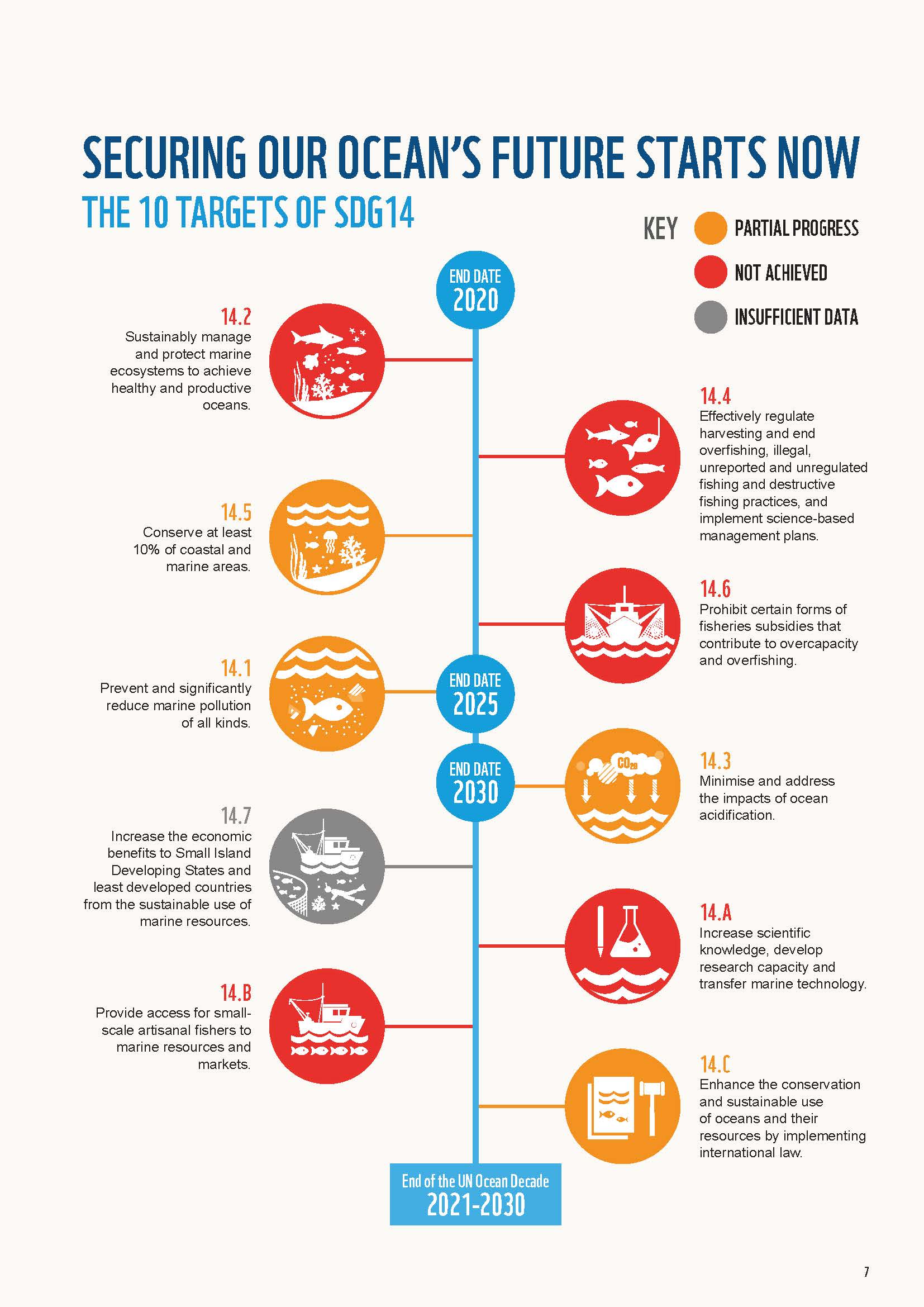Failing SDG14: EU on a cliff edge for ensuring a sustainable ocean
Posted on March, 03 2020
Europe is failing to implement the United Nations’ (UN) 2030 Agenda
Five years on from the adoption of the UN 2030 Agenda, a new WWF report sounds the alarm to European decision makers and the global signatories of the UN Sustainable Development Goals (SDGs) over failed progress on SDG14, the Goal for conservation and sustainable use of our ocean. WWF’s assessment shows that three of the four SDG14 targets due in 2020 will not have been achieved by the end of this year, with the fourth target only partly achieved. Collectively, the ten SDG14 targets aim to secure ocean resilience through robust protection of its diverse ecosystems and to safeguard its role as a vital carbon sink — outcomes which directly support livelihoods and economies tied to our seas. The WWF report shows that for two of the six targets related to the conservation and sustainable exploitation of marine biological resources, progress is “ongoing”, while lack of monitoring and accurate reporting remains a critical issue for measuring success towards achieving all ten SDG14 targets and the wider 2030 Agenda.
Dr Samantha Burgess, Head of Marine Policy at WWF European Policy Office said: “We must put an end to claiming to save nature and address climate change whilst ignoring two thirds of our planet. A healthy, productive and resilient ocean is essential to secure a sustainable blue future. The EU has a genuine opportunity to mitigate the disastrous impacts of the climate and biodiversity crises by stressing ocean action as an integral component of the European Green Deal.”

WWF finds the EU Member States to be unequivocally missing the mark on provisions for biodiversity conservation, healthy marine ecosystems and sustainable and viable fisheries. The absence of effective protection of marine ecosystems with sustainable management plans, failure to align the EU’s fleet capacity with fishing opportunities, the reintroduction of harmful fishing subsidies and sustained overfishing indicate critical gaps in compliance with existing EU legislation, including the Common Fisheries Policy, the Habitats Directive and the Marine Strategy Framework Directive. Following adoption of the European Green Deal, all EU Member States must intensify their efforts towards sustainable use of marine resources, with ecosystem-based management of our seas and fisheries in line with SDG14 and the wider 2030 Agenda.
SDG14 is shown to be significantly connected with all other SDGs, with 38% of all 169 SDG targets only achievable when the SDG14 targets have been successfully accomplished, particularly SDG1 (No Poverty), SDG2 (Zero Hunger) and SDG13 (Climate Action). Despite the marine environment’s importance to advance the 2030 Agenda, political will and finance remain insufficient.
Dr Anne-Cécile Dragon, Marine & Fisheries Policy Officer at the WWF European Policy Office, said: “EU policy makers and MEPs must push for real, demonstrable progress to achieve global sustainability, protect natural ecosystems and safeguard livelihoods and food security tied to resources in a changing climate. To do this, we must look beyond the individual Goals and their targets to address these issues comprehensively. This starts with bringing overfishing to an end and by effectively protecting marine ecosystems.”
As the world’s largest seafood market and with a marine area covering over six million square kilometres across four distinct sea regions, WWF calls on the EU to lead by example and stand by its commitments to all life above and below water. A transformation of EU and international ocean governance is urgently required. In the EU, this starts with the development of a coherent, overarching strategy to ensure that all the Sustainable Development Goals are achieved.
Notes to editors:
In 2020:
SDG 14.2, to sustainably manage and protect marine and coastal ecosystems ... and take action for their restoration in order to achieve healthy and productive oceans, will not be achieved.
SDG 14.4, to effectively regulate harvesting, end overfishing, illegal, unreported and unregulated (IUU) fishing and destructive fishing practices, and implement science-based management plans in order to restore fish stocks in the shortest time feasible..., will not be achieved.
SDG 14.6, to prohibit certain forms of fisheries subsidies which contribute to overcapacity and overfishing, eliminate subsidies that contribute to illegal, unreported and unregulated (IUU) fishing and refrain from introducing new such subsidies, will not be achieved.
SDG 14.5, to conserve at least 10% of coastal and marine areas, consistent with national and international law and based on the best available scientific information, will be partly achieved.
WWF recommended minimum actions to effectively achieve SDG14 targets and the UN 2030 Agenda include:
- EU Member States ensure that the main priority of Marine Protected Areas is the conservation of biodiversity and marine ecosystem services, not short-term economic opportunity. MPAs must effectively conserve and restore ecosystems, and include zones that are fully protected from destructive activities.
- EU decision makers commit to double the EU’s current level of removing CO2 from the atmosphere by 2030, achieved by supporting the activity and expansion of European carbon sinks, in particular through ecosystem restoration.
- EU Member States follow advice based on the best-available scientific evidence to set fishing opportunities aligned with sustainable levels and apply the precautionary approach when data on the status of marine populations is lacking.
- EU decision makers maintain the ban on harmful subsidies that increase fishing capacity and eliminate all subsidies to operational effort-enhancing costs, including engine replacement.
- The EU fully implements the Illegal, Unregulated and Unreported (IUU) Regulation and applies sanctions for non-compliant vessels to deter IUU activities and help compensate for the damage done to marine ecosystems, as well as to the communities impacted by reduced marine stocks and diminished seafood production economies.
Contact:
Larissa Milo-Dale
Marine Communications Officer
lmilodale@wwf.eu
+32 483 26 20 86

